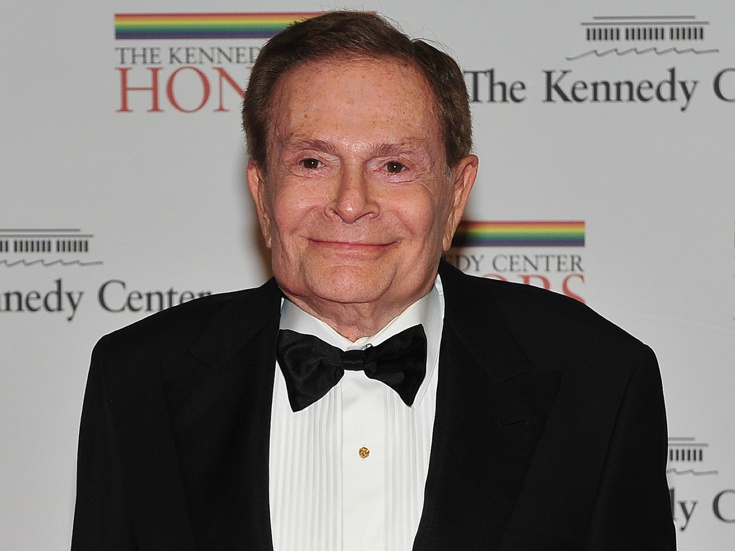Legendary Broadway Composer Jerry Herman, Who Wrote Hello, Dolly! & La Cage aux Folles, Dies at 88


(Photo: Ron Sachs-Pool/Getty Images)
Tony winner Jerry Herman, the celebrated composer/lyricist who made his mark on Broadway with award-winning scores to an array of musical comedies, died on December 26 in Miami. According to his goddaughter, Jane Dorian, Herman died of pulmonary complications. He was 88.
Known for his show-stopping numbers and dedication to the simple power of a hummable tune, Herman's career spanned half a century and five Tony nominations. From Hello, Dolly! (1964), to Mame (1966) to La Cage aux Folles (1983), Herman proved that the exuberant Broadway musical could survive the modern era, one of only two composer/lyricists to have three musicals run more than 1,500 consecutive performances on the Great White Way. He forged a pathway on Broadway, which celebrated the indefatigable spirit of musical theater and wrote shows that could break box offices, achieve critical acclaim, and champion stars like Angela Lansbury or Carol Channing.
Hello, Dolly!, Herman’s 1964 Tony-winning musical about the tenacious matchmaker Dolly Levi, was an instant classic when it premiered on Broadway. “Hello, Dolly!, which blew happily into the St. James Theater last night, has qualities of freshness and imagination that are rare in the run of our machine‐made musicals,” said the New York Times prophetically after the show’s opening night. The zest and ebullient spirit captured in Herman’s songs, exemplified by its title number “Hello, Dolly!,” rocketed the young composer to stardom and ushered the musical through 10 Tony Awards and four Broadway revivals.
Herman continued his work on Broadway with the musicals Mame (1966), Dear World (1969), Mack & Mabel (1974) and The Grand Tour (1979) before La Cage aux Folles premiered on Broadway in 1983, another marquee moment for the stage. More than just a show, La Cage aux Folles, which Herman wrote with Harvey Fierstein, was something of a social movement. Whereas Broadway had earlier dealt with gay relationships tangentially, La Cage placed the romance of nightclub manager George and drag performer Albin center stage. “I Am What I Am,” Herman’s act-one finale, became an anthem for gay life in the 20th century.
When Herman accepted his Tony Award for Best Original Score for La Cage, he memorably summed up his approach to musical theater. “There’s been a rumor around for a couple of years that the simple, hummable show tune was no longer welcome on Broadway. Well, it’s alive and well at the Palace [where La Cage was playing]," he said.
Some inferred that Herman was lobbing an insult at Stephen Sondheim, whose Sunday in the Park with George was also up for Best Original Score and whose cerebral approach to musical theater contrasted with Herman's style. However, Herman set the record straight to Broadway.com in 2004. "I believe that my comments upon winning the Tony for La Cage clearly came from my delight with the show business community's endorsement of the simple melodic show tune, which had been criticized by a few hard-nosed critics as being old fashioned,” he said. “’Old fashioned' is one of my favorite terms, and I was simply saying, 'Thank you for letting me be what I am.'"
Herman was openly gay and diagnosed with HIV in 1985, surviving the epidemic that took the lives of many of his contemporaries. He was born in New York City in 1931, and he was raised in Jersey City. Herman began playing piano at a young age, and an early and influential audition with Frank Loesser set him on path toward songwriting. He studied theater at the University of Miami, and made his Broadway debut with the revue From A to Z in 1960. Milk and Honey, Herman's 1961 musical about American widows visiting Israel, marked his first full-fledged Broadway production.
In 2009, Herman was honored with a Tony Award for Lifetime Achievement in the Theatre. Accepting the award, he offered a poignant retrospective on his defining theatrical career.
“Did you know that I was born on this street, and that my mother thought there was something special about the fact that her hospital window had a great view of the Winter Garden Marquee? Well, here I am, 77 years later, still on 50th street,” he said. “The journey from mom’s window to this iconic stage has been filled with so much joy and excitement and laughter and lifelong friendships,” Herman continued. “The thing I want you you to know is that I will hold this moment fast, because the best of times is now, is now, is definitely now.”